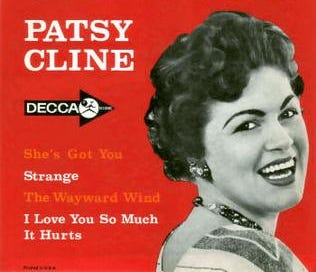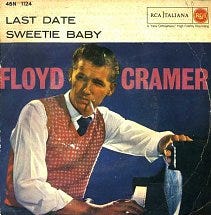"She's Got You" by PATSY CLINE
It's not country's greatest torch singer's biggest hit, but it could be her most revealing.
It's signed with love, just like it used to be
There’s a catch in Patsy Cline’s throat a minute and 14 seconds into the song. “She’s Got You” doesn’t quite make the podium when it comes to her iconic hits —“Walkin’ After Midnight,” “I Fall to Pieces,” and of course, “Crazy'' all put more coins in jukeboxes. The plangent ache in her voice so often defines her greatness, and it’s a bit too easy to think of it as a natural occurrence from her life: Cline famously cut her vocal for “Crazy” in one take, just weeks after a month-long hospital stay from an auto accident that nearly put her through the windshield. This moment, however, where she slyly stumbles over the words “I've got your memory, or… has it got me?” is one of many that make “She’s Got You” a bit more revealing of Cline’s artistry and that around her — from her torch singer embodiment of the lyrics to Owen Bradley’s genre-bending production and Floyd Cramer’s slip-note piano.
Unlike “Crazy,” which a number of singers had passed on as songwriter Willie Nelson pitched it around Nashville, “She’s Got You” was written especially for Patsy Cline. The story goes that songwriter Hank Cochran, who had written “I Fall to Pieces” with Harlan Howard, called Cline saying that he had her next hit, at which point she suggested he come over with a bottle of liquor and play it for her. It’s said that she and producer Owen Bradley often disagreed on which material to record, but both loved Cochran’s song, and a studio date was set in December of 1961, just after Cline’s appearance at Carnegie Hall and as “Crazy” was cresting on both the country and pop charts.
Owen Bradley had a firm hand and a light touch. He started at Decca Records in 1947 as a songwriter and arranger, and did the hands-on work on songs by artists like Ernest Tubb and Kitty Wells when higher-ups got the producer credit. By 1958, he was Vice President of Decca’s Nashville division and producing his artists his way. That way came to be called the Nashville Sound. The smooth, subtly jazzy “countrypolitan” style was further propagated by one of his former session guitar players, Chet Atkins1, and went on to gain influence far beyond Nashville. (Bradley’s influence on the sound of pop music is at least equal to Phil Spector’s.) His records are so captivatingly dynamic, they still sound big and lush even though they were recorded in the days of cutting four songs in three studio hours. These sessions were done in studios he built, first in a Nashville house and then the 75-foot steel Quonset hut behind it. As other labels put studios in neighboring properties, Music Row was literally built around him.
Floyd Cramer doesn’t sound like a country piano player; country piano players sound like Floyd Cramer. Self-taught on piano, Cramer was gigging around Shreveport, LA when he supported a 1955 Elvis appearance on the Louisiana Hayride. He spent the next year in Presley’s band with Scotty More, Bill Black, and DJ Fontana, but when Elvis moved to Hollywood, Cramer went to Nashville instead. In a 1960 Chet Atkins-produced session for Hank Locklin’s “Please Help Me, I’m Falling,” Cramer first played his slip-note piano style. Kramer takes the half-tone slide of pedal steel guitar by way of a jazz blue note, sliding one note into the next. Later in the year, the had pop hit with his instrumental “Last Date,” which didn’t crack the top ten on the country charts but was only blocked from the pop top spot by Elvis’s post-Army comeback single, “Are You Lonesome Tonight.”2 In a few years, slip-note was just what country piano sounded like.
Cramer’s spare blue notes on “Crazy” set the dusky tone for the song, forming the shadow around Cline’s spotlight. On “She’s Got You,” he’s playing more in his by-then-trademark slip-note style, but his deft intonations still shade the song. Every time his upper-register tinkling reappears, its music-box melody haunts her like the memory she can’t shake.
I've got the records
That we used to share
And they still sound the same
As when you were here
The only thing different
The only thing new
I've got the records
She's got you
For a record about heartbreak, it was diabolical of Cochran to write a lyric about records that remind someone of heartbreak. The device makes it impossible not to associate the song with the emotion it stirs — not that Cline ever needed much help in that department. By the end of 1961, she was healthy, and the year’s hits had both her and Bradley confident they knew what worked. Here, his dynamic sound clears even more room around her, giving her the space to be exquisitely subtle. And “She’s Got You” indeed worked: By early 1962, it became Cline’s second country #1 and third crossover pop hit; it was her first song to chart in the UK.
Country music is known for its story songs. The narrative that emerges here comes from Cline alone. Her vocal delivery is a marvel of restraint, keeping the pain she could bring to singing “Happy Birthday” just below the surface until the very last notes of the song. The first time Cline stumbles over “or… does it have me,” it almost sounds like a flub, like she lost her place. Then you realize her intent — she’s singing not as a woman who’s lost a lover but as one who’s lost her place in the world. When she later repeats the little pause, it’s more self-conscious, with a whisper of rueful chuckle. Through vocal phrasings alone, she tells a story of how heartbreak settles into resignation, and it sets up the final “she’s got you.” The Patsy Cline draws out those few words over a half dozen notes, at last filling them to the brim from her well of ache.
Patsy Cline, Owen Bradley, and The Nashville Sound Playlist
Sixteen songs in what could’ve been a day-long mix.
Cocaine & Rhinestones
For an opinionated, persuasively argued deep dive on what is and isn’t the Nashville Sound, please check out the Cocaine & Rhinestones podcast. multi-episode run on Owen Bradley, his imitators and, the Nashville A Team musicians who played on all of it.
Aoife O’Donovan
Aoife O’Donovan’s Age of Apathy album isn’t due until the new year, but the Live From Here and I’m With Her singer’s first single from the Joe Henry-produced record is out and marvelous.
Send Check or Money Order to…
Many of us who watched a lot of late-night TV know Floyd Cramer by this much-aired commercial for a collection of songs available on LP, cassette and 8-track tapes. I ask that you judge neither us nor Floyd for what we did in the ‘80s.
Last of the Summer Wine
With this newsletter on the whole getting a little long, I’m going to forgo the wine section of the email. Thanks to those of you who’ve said that you appreciated that bit. If you’d like to continue seeing more bonus wine and cocktails content in the future or care to comment, please drop a line here:
Thank You
Thanks for reading. If you could click the “like” heat above, that helps this thing get spread around. And please considering sharing with a friend or two.
Thanks again,
Scott
Atkins was a prolific and very successful producer. When he asked what the Nashville Sound was, he replied “money.”
Floyd Cramer is credited on the “Are You Lonesome Tonight” sessions, but most of the musicians were kicked out of the studio while Elvis sang in the dark.





